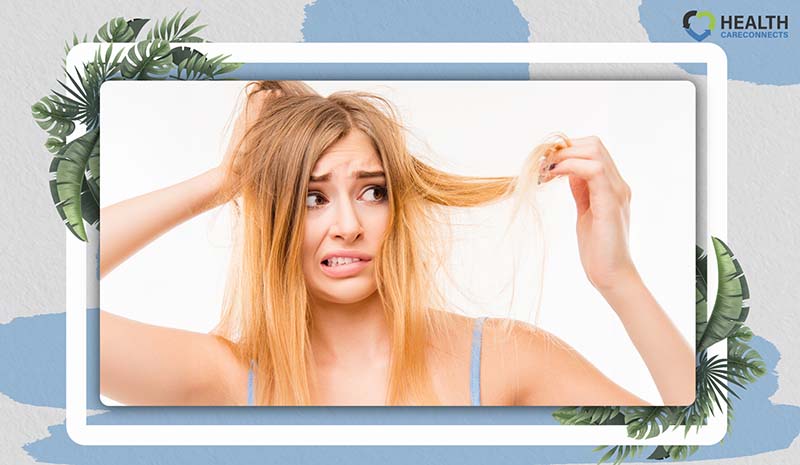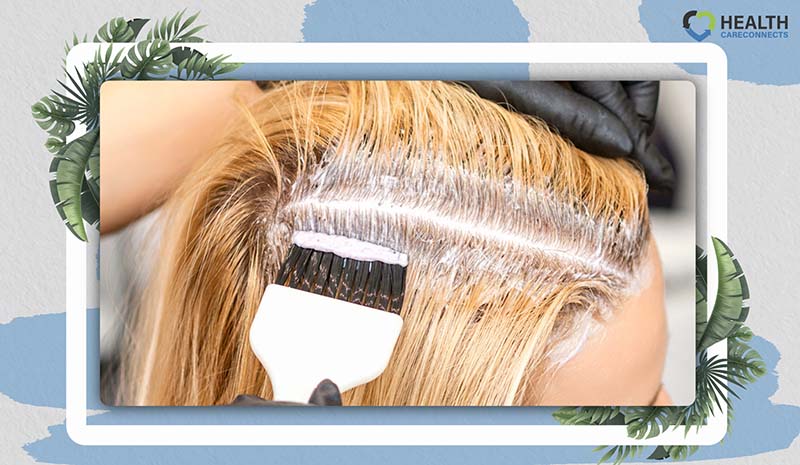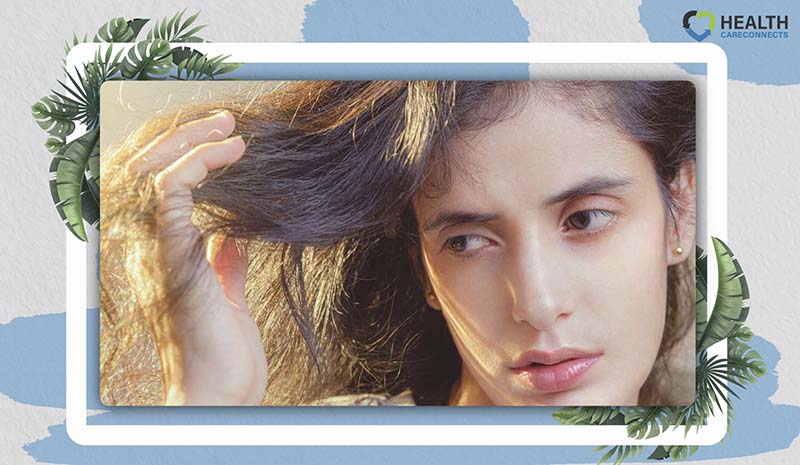Bleaching your hair can be incredibly appealing – there’s something thrilling about transforming your look with vibrant colors and fresh highlights. However, despite the excitement, bleaching is one of the most damaging hair coloring methods.
It works by lifting the hair’s outer layer to allow the bleach to fully absorb and change your hair’s natural color. This process can significantly compromise your hair’s health and strength.
If you’re concerned about thinning hair after bleaching or wondering, “Does bleaching hair cause hair loss?” you’re not alone. In this article, we’ll explore the potential risks of hair dye and bleaching and provide tips on how to maintain healthy hair despite the allure of color changes. Read on to learn more!
Does Bleaching Hair Cause Hair Loss
Does Bleaching Hair Cause Hair Loss? It’s a possibility.
Bleaching makes your hair dry, brittle, and less elastic – the perfect conditions for hair breakage and split ends. When your hair is damaged like this, hair loss becomes much more common. Bleached hair is porous and, therefore, much more prone to damage from styling tools like blow dryers or curlers.
While bleaching itself doesn’t directly cause hair loss, it does make your hair much more fragile, increasing the chances of breakage. Everyday activities like brushing or even sleeping can lead to more breakage because your hair becomes weaker. Breakage near the root can cause stubble, making it seem like you’re losing hair randomly.
It’s important to remember that although bleaching and highlighting can damage your hair significantly, they don’t usually cause hair to fall out unless there’s a mistake in the process. For example, leaving the bleach on for too long or using an incorrect mixture can damage your scalp and lead to more serious hair problems.
Notes:
- Be Gentle: Handle your bleached hair gently, especially when it’s wet, to avoid breakage.
- Avoid Heat: Minimize the use of heat styling tools to prevent further damage.
- Moisturize Regularly: Keep your hair moisturized with leave-in conditioners and oils to maintain its elasticity.

How Often Should You Bleach Your Hair?
Ideally, you should bleach your hair no more than once every three to eight weeks.
- All-Over Bleaching: When bleaching your entire head, wait until new growth reaches about ½ inch. Only apply the bleach to the new growth to minimize damage.
- Highlights: For foil highlights, wait six to eight weeks, or until new growth is about 1 inch, to prevent overlap and maintain hair health. This also applies to treatments like balayage.
“Waiting this amount of time will give both your hair and scalp time to recover. Your natural oils will help moisturize your scalp and hair,” says Elyse Clark, owner of The Hair Retreat in Chicago.
Notes:
- Listen to Your Hair: If your hair feels especially dry or damaged, consider waiting longer between bleaching sessions.
- Use Gentle Products: Opt for sulfate-free shampoos and conditioners to help maintain moisture in your hair.
- Healthy Diet: Eating a balanced diet rich in vitamins and minerals can promote hair health and recovery.
- Hydration: Drink plenty of water to keep your hair hydrated from the inside out.
How Does Bleaching Hair Cause Hair Loss?
Bleaching hair involves removing the natural pigment, melanin, from your hair shaft through a process called oxidation. Melanin is what gives your hair its natural color, and to make your hair lighter, this pigment needs to be stripped away.
The most commonly used bleaching agents are hydrogen peroxide and ammonia. These two chemicals are often mixed together because, when used separately, they are unstable and slow at lightening the hair. When combined, they work more efficiently and effectively.
The oxidation process starts when bleach is applied to your hair. The oxidizing agents, hydrogen peroxide and ammonia, break down the melanin in your hair. This chemical reaction removes the color from your hair, resulting in a lighter shade.
It’s important to be aware that some products might advertise themselves as ‘peroxide-free’ to appear less damaging. However, these products still contain other oxidizing agents that can be just as harmful to your hair as hydrogen peroxide.
Notes:
- Moisture Loss: Bleaching can lead to significant moisture loss, making your hair feel dry and brittle.
- Weakened Hair Structure: The process weakens the hair structure, making it more prone to breakage and split ends.

Signs of Hair Damage Due to Hair Bleaching
The most common signs of bleach damage in your hair include:
- Dullness and Loss of Shine: Your hair may look lackluster and lose its natural glow.
- Brittle Strands: Hair becomes prone to breakage, feeling fragile and weak.
- Flyaways and Split Ends: More noticeable flyaways and an increase in split ends.
- Excess Tangling: Hair becomes harder to manage and tangles easily.
- Dry, Rough Texture: Hair feels dry and rough to the touch.
In some cases, although rare, extreme bleach damage can cause hair to snap off or fall out. This usually happens due to misuse of bleach, such as double bleaching on the same day or lifting hair that’s too delicate.
Your colorist should know the proper steps to prevent over-processing, so listen to them if they suggest taking a break from bleaching. They have your hair’s best interests in mind.

Notes:
- Regular Trims: Schedule regular trims to keep split ends at bay.
- Cool Water Rinses: Rinse your hair with cool water to help seal the cuticle and maintain smoothness.
Can You Bleach Your Hair Twice in One Day?
Bleaching can lead to various problems for your hair, such as increased roughness, frizz, and breakage. It is a harsh technique for removing color, and it can cause significant damage to the hair’s structure.
While it is possible to bleach your hair twice, it should not be done on the same day. Bleaching twice in one day can lead to severe hair breakage and thinning. Your hair needs time to recover between bleaching sessions to avoid excessive damage.
Notes:
- Wait Between Sessions: Always wait several weeks between bleaching sessions to allow your hair to recover.
- Test Strands: Perform strand tests to assess how your hair reacts to bleach before committing to a full application.
- Nourishing Products: Use nourishing shampoos and conditioners specifically designed for bleached hair to maintain its health.
Is Hair Bleaching During Pregnancy Safe?
If you’re considering lightening your locks during pregnancy, you might wonder if bleaching your hair is safe. Bleach is generally considered safe to use during pregnancy, similar to hair dye. However, it’s advisable to wait until after the first trimester before bleaching your hair. Additionally, taking extra precautions to ensure the product isn’t directly applied to the scalp is recommended.
“During pregnancy, your skin is often more sensitive to new ingredients, so prolonged exposure to the scalp/skin can cause irritation,” says Helen Reavey, a celebrity hair stylist and founder of the haircare brand Act+Acre.
Notes:
- Well-Ventilated Area: Ensure the area where you’re bleaching your hair is well-ventilated to minimize exposure to fumes.
- Avoid Scalp Contact: Take care to avoid direct contact of the bleach with your scalp to reduce the risk of irritation.
- Natural Alternatives: Consider using natural hair lightening methods as an alternative to bleach during pregnancy if you’re concerned about chemical exposure.
How to Effectively Care for Your Hair After Bleaching
To combat hair loss from bleaching, it’s crucial to use products that mitigate the negative effects. Preparation is key. If you’re planning to bleach your hair, start by using a pre-shampoo and conditioning treatment three days before the bleaching process. After bleaching, incorporate a deep treatment into your routine once a week. This will infuse moisture into your hair, making it more elastic and less prone to breakage, while also enhancing shine and manageability.
Invest in a daily damage defense product that you can apply before stepping out. This product will shield your hair from UV rays by sealing the gaps in your hair strands. Despite not being apparent, environmental factors such as pollution, air conditioning, wind, and UV rays can significantly damage bleached hair over time.
Because bleached hair is more susceptible to breakage, adjust your hair care regimen accordingly. Avoid rough brushing and tight hairstyles that can cause stress on the hair shaft. Opt for lower heat settings when using styling tools, and always apply a hair thickening serum to protect against heat damage.
Remember, if you decide to bleach your hair, ensure it stays protected. Be gentle with it, keep it hydrated, and pay attention to any warning signs of damage. If you notice increased hair shedding, consider taking a break from coloring and highlighting for a few months to allow your hair to recover.
Conclusion
In conclusion, hair loss after bleaching can result from the weakening of hair strands due to harsh chemicals. However, in most cases, this hair loss is temporary and not permanent. Does bleaching hair cause hair loss? Yes, it can, but proper post-bleach hair care is crucial to minimize damage and encourage healthy hair growth.
Incorporating hair growth stimulating products can aid in stimulating hair follicles and repairing damaged hair. Additionally, itchy and dry scalp after bleaching can be common side effects leading to scalp irritation. Being mindful of these potential effects and taking appropriate measures can help preserve the health and vitality of both the hair and scalp during and after the bleaching process.
For those seeking more information and honest product reviews, I recommend visiting HealthCareConnect.

Dr. Joyce Slater: Your Guide to Informed Health Choices
Dr. Joyce Slater shines as a distinguished expert in the field of nutrition and public health. Contributing her vast expertise to HealthConnectbc, she embodies a deep-seated passion for enhancing public well-being. As a respected figure in her field. Dr. Slater’s academic journey and professional achievements are nothing short of inspirational.
Holding a significant position as a researcher and educator, Dr. Slater has delved deeply into the intricacies of food literacy and nutritional science. Her work, prominently featured in numerous esteemed scientific publications, underscores her dedication to expanding our understanding of food’s role in health and society.
At the heart of Dr. Slater’s professional ethos is a profound desire to positively impact individual lives through education and research. She often says, “Empowering people with the knowledge to make healthier choices is the most rewarding aspect of my work.” This principle is the cornerstone of her involvement with HealthConnectbc, where she strives to provide reliable and practical health advice.
Dr. Slater’s contributions to HealthConnectbc are multifaceted: academically, she offers insights into the complex world of nutrition and health, enhancing both public understanding and professional practices. Additionally, she is instrumental in guiding and inspiring the next generation of health professionals, thus fostering future excellence in the field.
Juggling rigorous research with her educational duties, Dr. Slater demonstrates an unwavering commitment to her profession. Her approachable nature and genuine concern transcend the confines of academia, touching the lives of everyone she interacts with. Dr. Slater looks forward to continuing her journey of discovery and education, dedicated to the ongoing improvement of public health and nutrition.
At HealthConnectbc, Dr. J. Slater is not just a contributor; she is a guiding light, dedicated to enlightening and motivating individuals towards a healthier and more informed lifestyle.
PUBLISHED ARTICLES
- Food literacy competencies: A conceptual framework for youth transitioning to adulthood (2018)
- Self-perceived eating habits and food skills of Canadians (2016)
- Challenges to acquiring and utilizing food literacy: Perceptions of young Canadian adults (2016)
- Socio-demographic and geographic analysis of overweight and obesity in Canadian adults (2009)
- Sustainable well-being: Concepts, issues, and educational practices (2014)

